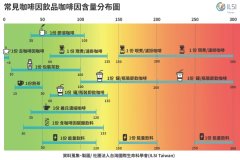ILSI confirms caffeine security code ≠ caffeine intake limit or iron law

For professional baristas, please follow the coffee workshop (Wechat official account cafe_style)
The rigorous caffeine systematic Review of ILSI North America, published in the Journal of Food and Chemical Toxicology (Food and Chemical Toxicolog) in April 2017, reaffirmed the benchmark conclusion established by Nawrot et al in 2003 that there was no adverse effect or no change in acceptable caffeine intake, 400mg / day for adults (lethal dose of 10g) It is 300mg / day for pregnant women (including those preparing for pregnancy) and 2.5mg / kg / day for 12-year-old 19-year-old and 3-year-old 12-year-old children. These data are simplified to 400mg / kg / day for adults)-300mg / day for pregnant women (pregnant women)-2.5mg / day for teenagers and children (BW is the abbreviation for Body Weight) because they are not yet fully developed and their weight varies greatly. This 400-300-2.5 BW is the security password for caffeine. However, when interpreting this data, people should note that this series of figures is only used as a reference value for ordinary people. Because there are too many variables among individuals, no data can be fully applied to the safe dose of the whole population. Practical application should be considered according to their own conditions, and this data should not be regarded as the upper limit of caffeine intake or iron law.
The report's conclusions on the recommended daily intake of 400mg caffeine for healthy adults are consistent with the US dietary guidelines for 2015-2020 to drink 3-5 cups of coffee per day (240ml per cup), the caffeine intake limit of 400mg per day, and the EU Food Safety Agency (EFSA) recommendation of 400mg per day in 2015. Taiwan's current recommendation for caffeine intake is that it is best not to exceed 300 mg a day.
Important Notice :
前街咖啡 FrontStreet Coffee has moved to new addredd:
FrontStreet Coffee Address: 315,Donghua East Road,GuangZhou
Tel:020 38364473
- Prev

Systematic review of potential adverse effects of caffeine intake
Professional barista exchanges, please pay attention to coffee workshop (Weixin Official Accounts cafe_style) systematic review to explore the potential adverse effects of caffeine intake in the world's most popular caffeine research report, the first review of caffeine safety assessment written by Nawrot et al. and peer-reviewed in 2003, the most widely cited internationally, also added
- Next

The amount of non-standardized caffeine prepared by commercial drinks varies greatly from serving to serving.
Professional baristas Please follow the Coffee Workshop (official Wechat account cafe_style) according to the caffeine content distribution map of common caffeinated drinks on the market, 400mg of caffeine is roughly equivalent to 4 cups of ordinary freshly brewed coffee, or 10 cans of carbonated drinks, or 2 cans of energy drinks. In detail, it is important to note that when estimating daily caffeine intake
Related
- Can I make coffee a second time in an Italian hand-brewed mocha pot? Why can't coffee be brewed several times like tea leaves?
- Hand-brewed coffee flows with a knife and a tornado. How to brew it? What is the proportion of grinding water and water temperature divided into?
- What is the difference between Indonesian Sumatra Mantinin coffee and gold Mantinin? How to distinguish between real and fake golden Mantelin coffee?
- What does bypass mean in coffee? Why can hand-brewed coffee and water make it better?
- Unexpected! Ruixing Telunsu lattes use a smoothie machine to foam milk?!
- % Arabia's first store in Henan opens into the village?! Netizen: Thought it was P's
- Does an authentic standard mocha coffee recipe use chocolate sauce or powder? Mocha Latte/Dirty Coffee/Salty Mocha Coffee Recipe Share!
- What is the difference between Vietnam egg coffee and Norway egg coffee? Hand-brewed single product coffee filter paper filter cloth filter flat solution!
- What is the difference between sun-cured and honey-treated coffee? What are the differences in the flavor characteristics of sun-honey coffee?
- How to make Italian latte! How much milk does a standard latte use/what should the ratio of coffee to milk be?

